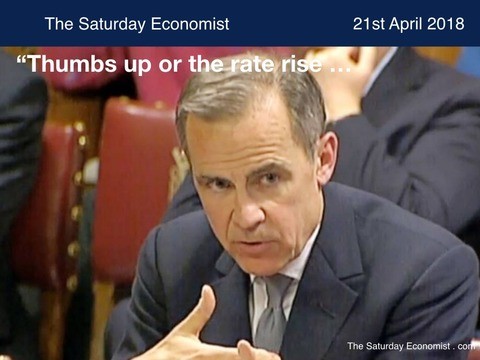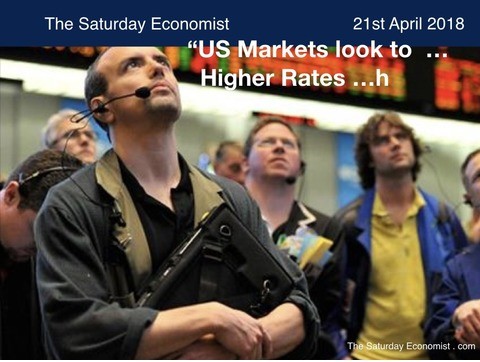|
Saturday 21st April 2018
Hi Friend,
A Rate Rise in May ... not if Carney has his way ...
|
|  |
It all seemed so straightforward. Just a few weeks ago, markets expected rates to rise in May. Two gradual rate rises of around 25 basis points this year would mean base rates around 1% by the end of the year. Two further rate increased of similar dimension in the years ahead, would suggest rates would be around 2% by the end of 2020. All is clear, or so it seemed.
Michael Saunders is a hawk. He voted for a rate rise in March along with Ian McCafferty. At a speech in Strathclyde this week, Saunders argued future increases may be "gradual" but they need not be "glacial". It is a subtle distinction. It must have been very cold in the North of Scotland, the only way to make sense of this.
Interest rates would be likely to rise in a series of modest and measured steps. Since Bank of England independence, the MPC has experienced four tightening cycles. Rates on average have increased by 100 basis points over a period of eight months. That is the equivalent of 150 basis points per annum. Now the new "norm" for escalation, is just 50 basis points each year.
A 2% level has become the new "neutral" target rate for monetary policy. It is all very strange. A 2% neutral rate is inconsistent with a 2% inflation target. Fisher must be turning in his grave. The neutral rate should be twice as high at least. Even so, with the new "neutral rate", ten year gilt yields would increase to around 3% over two years, from current levels of 1.5%.
The implicit capital loss for gilts is around 50%. Andy Haldane has made it clear, QE has created the biggest bond bubble in history. No wonder the MPC is reluctant to pop the balloon with £400 billion of government debt on the balance sheet.
Mark Carney made it clear this week, a rate rise in May is no longer a certainty. The economics data is mixed. Unemployment fell to 4.2%, there are 1.4 million out of work. There are over 800,000 vacancies in the economy. Wage growth averaged 2.8% in the three months to February. Recruitment difficulties are increasing. All good reasons for pursuing the path of monetary tightening.
On the other hand, the latest retail sales figures were pretty gruesome. Snow kept shoppers at bay, (or on ebay). Car sales are taking the hit from tighter consumer spending and the "Demonisation of Diesel". Growth is expected to have slowed to around 1.4% in the first quarter. Worries about Brexit persist ... and with good reason ...
The good news inflation fell to 2.5% in March. Real earnings are increasing again. The outlook for households and consumer spending is improving. If the government committed to spending on housing and infrastructure, growth would be much improved this year. So what happens next?
"It is time to fix the roof, now the snow has blown away"
It is time to fix the roof, now the snow has blown away. The Bank of England must seize the opportunity to raise rates next month ... |
| |
 |
U.S. Markets look to higher rates ...
In the US markets are expecting rates to rise three or four times this year. Inflation increased to 2.4% in March, growth is expected to be almost 3% in 2018. The unemployment rate is just 4.1% with expectations this will fall to 3.9% by the end of the year.
The Trump administration has embarked on a spending spree of $1.3 trillion dollars at exactly the wrong stage in the economic cycle. Both the internal and external deficits are set to expand significantly pushing base rates and bond yields higher and the dollar lower.
The government deficit was over $200 billion in February and again in March. For the year as whole the deficit is likely to increase to over $1 trillion dollars. Government borrowing will increase to $20 trillion dollars, that's around 100% of GDP. Within four years, the government will be spending as much on interest payments as it does on the Pentagon and the FBI!
The external trade deficit is heading towards $600 billion this year, that's around 3% of GDP. Trump behaves like the Leader of a Banana Republic and is on the economic path to create one.
Trump behaves like the Leader of a Banana Republic
and is on the economic path to create one.
The Federal reserve "Blue Dot" guideline anticipates rates to increase to 3.5% in 2020 before falling back to around 3% over the longer term. Ten year bond yields are testing the 3% level. 4.5% seems quite attainable in the next couple of years. Our guideline remains, to understand UK rates, follow the Fed and add six months at most. The Bank really should make the move in May and begin the path of "normalisation".
The Vera Lynn" School of Economic Thought
I am announcing the creation of "The Vera Lynn" School of Economic Thought" with a series of MP3 downloads. Top hits include "Recession Again, Don't Know Where, Don't Know When"; "There will be J curves over the white cliffs of Dover"; "Auf Viedersehen EU" and "It hurts to say goodbye". More tracks to follow ...
The Saturday Economist WhatsApp Group
On a more serious note, I have created The Saturday Economist WhatsApp Group. If you are on WhatsApp and would like to be involved, just click on this link to sign up! We plan to have some fun with this.
That's all for this week, have a great week-end, I had a great break in Gran Canaria, with ten days of sunshine. I have returned refreshed, I missed the key board and the economics! The great thing about addiction, now I know I can stop anytime I like ...
John
|
| |
| | © 2018 John Ashcroft, Economics, Strategy and Social Media, experience worth sharing.
______________________________________________________________________________________________________________
The material is based upon information which we consider to be reliable but we do not represent that it is accurate or complete and it should not be relied upon as such. We accept no liability for errors, or omissions of opinion or fact. In particular, no reliance should be placed on the comments on trends in financial markets. The receipt of this email should not be construed as the giving of advice relating to finance or investment.
______________________________________________________________________________________________________________
If you do not wish to receive any further Saturday Economist updates, please unsubscribe using the buttons below or drop me an email at jkaonline@me.com. If you enjoy the content, why not forward to a friend, they can sign up here ...
_______________________________________________________________________________________
For details of our Privacy Policy and our Terms and Conditions check out our main web site. John Ashcroft and Company.com
_______________________________________________________________________________________________________________
Copyright © 2018 The Saturday Economist, All rights reserved. You are receiving this email as a member of the Saturday Economist Mailing List or the Dimensions of Strategy List. You may have joined the list from Linkedin, Facebook Google+ or one of the related web sites. Our mailing address is: The Saturday Economist, Tower 12, Spinningfields, Manchester, M3 3BZ, United Kingdom.
|
| |
|
|